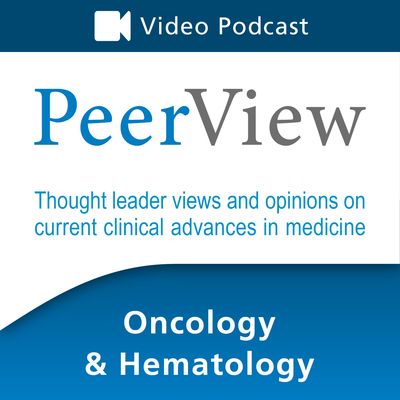PeerView (PVI) is a leading provider of high-quality, innovative continuing education (CME/CE/CPE and MOC) for clinicians and their interprofessional teams. Combining evidence-based medicine and instructional expertise, PeerView activities improve the knowledge, skills, and strategies that support clinical performance and patient outcomes. PeerView makes its educational programming and expert-led presentations and symposia available through its network of popular podcast channels to support specific specialties and conditions. Each episode includes a link to request CME/CE credit for participation. PeerView is solely responsible for the selection of topics, the preparation of editorial content, and the distribution of all materials it publishes.
http://ww2.peerview.com
Kathryn Beal, MD, and Sandip Patel, MD - Challenges, Controversies, and Opportunities in the Management of EGFR-Mutant Lung Cancer With Central Nervous System Metastases: Working Together to Improve Patient Outcomes
Go online to PeerView.com/PPF860 to view the activity, download slides and practice aids, and complete the post-test to earn credit. Central nervous system (CNS) metastases occur commonly in patients with lung cancer, and those patients with epidermal growth factor receptor (EGFR)-mutant non–small cell lung cancer (NSCLC) are particularly prone to their development. Treatment of brain metastases is challenging, and there are varied perspectives among different specialists about the best approach—if, when, and how to use local therapies, systemic therapies, or different treatment modalities in combination or sequence, etc. Clinical trials are underway to try to answer some of these critical questions about which treatment strategies yield the best results for these patients. This PeerView Live MasterClass and Practicum on-demand educational activity features a panel of multidisciplinary experts in EGFR-mutant lung cancer and CNS metastases who discuss the evolving evidence, clinical challenges, and practicalities of patient care. Real cases are debated from multiple perspectives, with an emphasis on information and guidance relevant for radiation oncologists. Upon completion of this activity, participants should be better able to: Describe molecular pathways that drive malignancy in lung cancer and the oncogenic activation of tyrosine kinases, such as mutations in EGFR, and the epidemiology and presentation of CNS metastases in EGFR-mutant lung cancer, Discuss the mechanisms of action, characteristics, and safety/efficacy profiles of the various EGFR TKIs available for the treatment of EGFR-mutant NSCLC throughout the continuum of advanced disease, including in patients with CNS metastases, Summarize the efficacy and safety data of available and emerging treatment strategies used in the management of brain or leptomeningeal metastases in patients with EGFR-mutant NSCLC, including the use of local therapies such as radiation, systemic therapies such as EGFR TKIs, and sequential/combination treatment approaches, Implement individualized treatment plans for patients with EGFR-mutant lung cancer with CNS metastases, including in the context of clinical practice or clinical trials, based on the latest evidence, recommendations, and effective multidisciplinary collaboration and coordination of care
